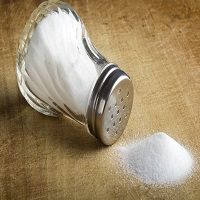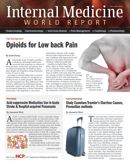Publication
Article
Internal Medicine World Report
Salt Intake Not Linked to Cardiovascular Disease or Heart Failure
Author(s):
In a study of older adults, salt intake was not associated with the risk of cardiovascular disease, heart failure, or mortality.

Cardiovascular disease (CVD), heart failure (HF), or death in older Americans are not linked to salt intake, according to research published in JAMA Internal Medicine on January 19, 2015.
Researchers from Emory University in Atlanta assessed a decade’s word of follow up data from more than 2,500 patients aged 71-80 years recruited between April 1, 1997 and July 31, 1998 in order to examine the association between salt intake and mortality, incident CVD, and incident HF in older adults. The patients were given a questionnaire that evaluated salt intake at baseline. The food frequency survey also examined salt intake in variables at these levels: less than 1,500 mg/d (291 patients, 11%); 1,500 to 2,300 mg/d (779 patients, 29.5%); greater than 2,300 mg/d (1,562 patients, 59.5%).
“There is ongoing debate on how low should we go when it comes to dietary sodium restriction recommendations and not much data on restriction among older adults, especially those with their blood pressure on target,” study leader Andreas P. Kalogeropoulos, MD, MPH, PhD said in a press release.
More sodium was consumed by men than women, the researchers found (2850 mg/d, 25th to 75th percentile, 2,140-3,640 mg/d and 2,320 mg/d, 25th to 75th percentile, 1,760-2,950 mg/d, respectively).
White patients (who made up 61.7% of the study population) and patients with diabetes were characteristics of patients who consumed more sodium. Less sodium was consumed by hypertension patients. Greater sodium consumption was associated with higher albumin and creatinine levels, but lower cholesterol levels in the patients.
After 10 years, 881 patients died. Mortality rates were 33.8%, 30.7%, and 35.2% among participants consuming less than 1,500, 1,500-2,300, and more than 2,300 mg/d sodium, respectively. Of the patients without CVD at baseline (1,981 participants), 572 had developed CVD over the follow up years at a rate of 28.5, 28.2, and 29.7% among the patients consuming less than 1,500, 1,500-2,300, and more than 2,300 mg/d sodium, respectively. A decade later, 398 patients from the total population developed HF at a rate of 15.7, 14.3, and 15.5% for patients with a sodium intake of less than 1,500, 1,500-2,300, and more than 2,300 mg/d sodium, respectively.
Patients were given the opportunity to self report their appetite and adoption of a low salt diet. Just 3.5% of participants rated their appetite as poor or very poor, and no correlation was found among those patients and sodium intake. One in 5 patients reported adopting a low salt diet, but sodium intake among adopters and non adopters was very similar. A self reported low salt diet was not associated with risk of mortality, CVD, or HD.
“Patients should not interpret our findings as a ‘license’ to consume more salt,” Kalogeropoulos stressed, noting that these findings are only appropriate for older adults without pre existing CVD or HF.
“Our data emphasize the need for stronger evidence, preferably from rigorous controlled trials testing additional thresholds for sodium intake in older adults.”






